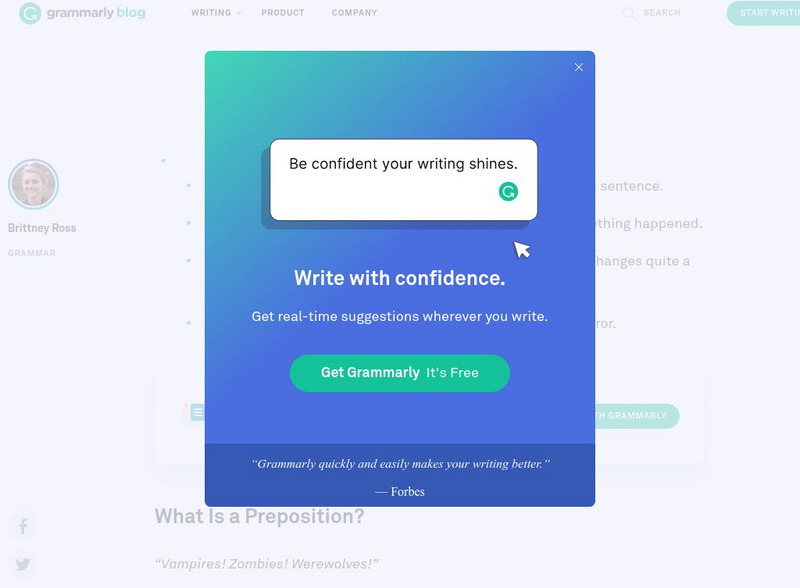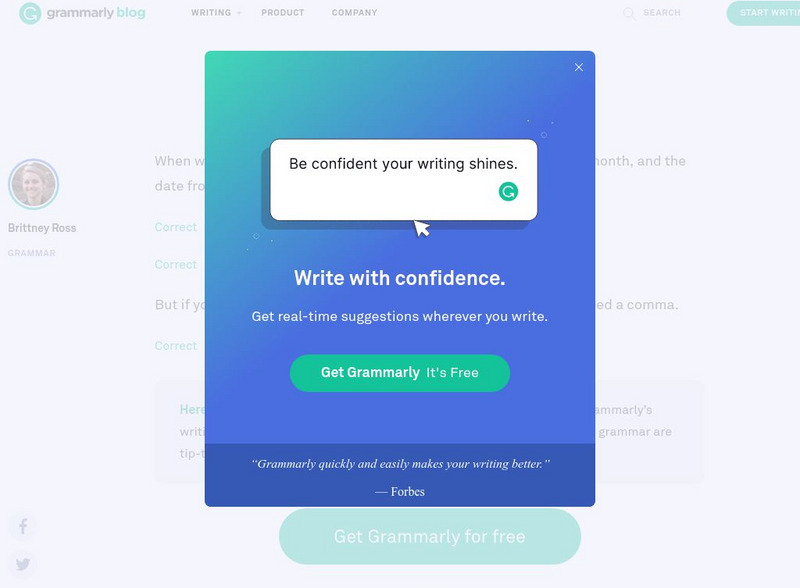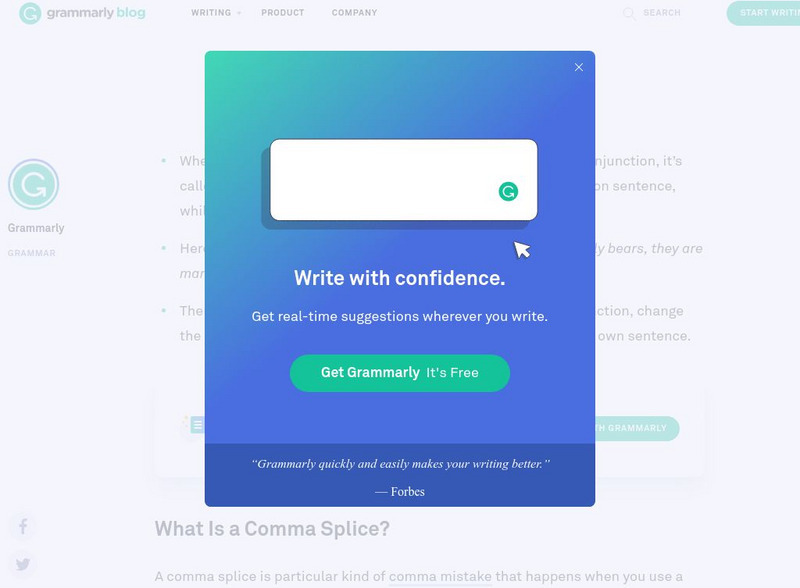Grammarly
Grammarly Blog: Comma Between Direct Quote and Attributive Tag
This page explains the comma placement needed between a direct quote and its speaker dependent upon the location of the attributive tag. It includes examples of various tag locations.
Grammarly
Grammarly Blog: Capitalization: Countries, Nationalities, and Languages
This page explains the rule requiring the capitalization of the names of countries, nationalities, and languages with examples of each.
Grammarly
Grammarly Blog: Anyway, Anyways, or Any Way
This page focuses on formal and informal use of "anyway," anyways," and "any way." Anyways is very infomal and should not be used; "anyway" is correct to mean "in case of" and "any way" should be used for all other situations. Examples...
Grammarly
Grammarly Blog: Uses of Prepositions
This page explains the uses of prepositions including to show direction, time, location, and spatial relationships. Examples are provided.
Grammarly
Grammarly Blog: Every Time
This page explains and provides the rules for use of the two-word compound "every time."
Grammarly
Grammarly Blog: Capitalization
This page reminds the writer to follow capitalization rules including for beginning of sentences, proper nouns, and titles of people and works.
Grammarly
Grammarly Blog: Comma Between Correlative Conjunction Sets
This page provides the rules and exceptions for the use of commas when using corratative conjuction sets such as either or, or neither nor, or not only but also. No commas are needed between them unless the comma is needed for other...
Grammarly
Grammarly Blog: Ending a Sentence With a Preposition
This page explains when it is acceptable to end a sentence with a preposition and when it is not.
Grammarly
Grammarly Blog: Double Negatives: 3 Rules You Must Know
This page explains the 3 rules for double negatives: each subject-predicate construction should only have one negative form, a double negative is a non-standard sentence construction that uses two negative forms, and standard English is...
Grammarly
Grammarly Blog: Future Perfect Tense
This page explains what future perfect tense means and how it is formed.
Grammarly
Grammarly Blog: Capitalization:titles of Books, Articles, Songs
This page explains the rules for capitalizing titles: In informal writing all words may be capitalized, but in formal writing, articles, conjunctions, and prepositions are NOT capitalized unless they begin a sentence. Examples are provided.
Grammarly
Grammarly Blog: Geographical Use of Definite Article The
This page provides rules for when to use and not use the article "the."
Grammarly
Grammarly Blog: Everyone vs. Every One
This article provides the rules for the proper use of the words "everyone" and "every one" with examples.
Grammarly
Grammarly Blog: Comma in Dates
This page focuses on the use of commas when writing dates; a comma is used to separate the day from the month, and the date from the year. Examples are provided.
Grammarly
Grammarly Blog: Comma Before Too
This page explains the use of commas to emphasize the word "too" in a sentence; the use of one, two, or no commas depend of the use of "too" and its placement in the sentence.
Grammarly
Grammarly Blog: Comma After Question Mark
This page explains how to puctuate a direct quotation that ends in a question mark or an explanation point. If the quote comes before the attributive tag, no comma is needed; if the attributive tag comes before the quote, a comma is...
Grammarly
Grammarly Blog: Comma Splice
This page focuses on the misuse of commas by using them to connect two independent clauses, resulting in a comma splice. It offers examples and suggestions for correcting them. It also provides exceptions to the rule with examples.
Grammarly
Grammarly Blog: Comma With Subjects and Verbs
This page focuses on the misuse of a comma when it is used to separate the subject of the sentence from the verb. It provides examples of such sentences and one exception to the rule.
Grammarly
Grammarly Blog: Comma After Introductory Clauses
Rules and examples for using commas correctly with an introductory clause.
Grammarly
Grammarly Blog: Conditional Sentences. Was Instead of Were in the Unreal If
This Grammarly Handbook resource clarifies topic of conditional sentences. The hypothetical situation of using the verb was in a clause beginning with the word if is discussed.
Grammarly
Grammarly Blog: Exclamation Mark
This page explains the uses of exclamation marks including when to use and not use them and provides examples.
Grammarly
Grammarly Blog: Conditional Sentences. Would Have in the if Clause
This Grammarly Handbook resource clarifies examples of conditional sentencs. The examples provided in this resource include the word if, the phrase would have, and a past participle.
Grammarly
Grammarly Blog: Comma Before Parenthesis
This page explains the proper use of commas with parenthesis: no comma before a parenthesis, no comma after a parenthesis unless it is needed for another reason such as a long introductory clause in a complex sentence, and no commas if...
Grammarly
Grammarly Blog: Each and Every
This page explains the proper use of the singular words "each" and "every" and provides examples.

























